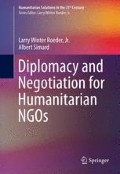Abstract
Chapter 9 covers the role of funding as fuel for diplomatic efforts, what donors look for, and how to find them. Special attention is given to potential benefits as well as conflicts of interest that can arise from receiving funds from governments or commercial institutions.
Access this chapter
Tax calculation will be finalised at checkout
Purchases are for personal use only
Notes
- 1.
MSF (not a member of InterAction). MSF determines people’s needs by conducting its own evaluations on the ground. More than 90 % of MSF’s overall funding comes from millions of private sources, not governments. This goes up to 100 % for certain contexts like Afghanistan. This allows MSF to act and speak independently from any pressure and to stay outside the cluster system initiated by the United Nations coordinating humanitarian actions. The organization does not take sides in armed conflicts, provides care on the basis of need, and pushes for independent access to victims of conflict as required under international humanitarian law (Tronc 2012). That said, it does criticize governments and non-state actors.
- 2.
The constitutional issue was that USAID said to get USAID funds NGOs would have to espouse a policy of opposition to prostitution which would limit their ability to use non-USAID funds to work with prostitutes. One of the two courts which heard the case agreed that USAID was unconstitutionally attempting to compel speech.
- 3.
Sonagachi is one of the oldest and largest red-light districts in the city.
- 4.
Thanks to UN/OCHA staff for help on this.
- 5.
Thanks to UN/OCHA staff for help on this.
- 6.
Thanks to UN/OCHA staff for help on this.
- 7.
Thanks to UN/OCHA staff for help on this.
References
Bari, E. (2008, November 12). Memo from Managing Director, Grameen Fisheries & Livestock Foundation to FAO, Regional Office, Bangkok. Memo to FAO, Regional Office, Bangkok. Dhaka, Bangladesh: Grameen Fisheries & Livestock Foundation.
Bryant, L. (2010, January 26). Donors expected to make good on Haiti relief pledges. Retrieved from Voice of America News: http://www.voanews.com/
Charny, J. (2012, August 6). Government funding practices. (L. W. Roeder, Interviewer)
GHD Initiative. (2010). About good humanitarian donorship initiative. Retrieved July 28, 2010, from Good Humanitarian Donorship Initiative: http://www.goodhumanitariandonorship.org/
Harrell-Bond, B. (2002). Can humanitarian work with refugees be humane? Human Rights Quarterly, 24(1), 51–85.
Hoffman, J. (2010, August 28). Email interview. (L. Roeder, Interviewer).
Horekens, J. (2004, October 13). Administrative matters on WCDR. (L. Roeder, Interviewer).
IATI. (2011, December 16). About IATI. Retrieved December 18, 2011, from The International Aid Transparency Initiative: http://www.aidtransparency.net/
Mas de Xaxàs, M., O’Reilly, K., Evans, C., Higgins, D., Gillies, P., & Jana, S. (2008). Meeting community needs for HIV prevention and more: Intersectoral action for health in the Sonagachi red-light area of Kolkata. Geneva: WHO.
Nash, G. (1988b). The life of Herbert Hoover: The humanitarian 1914–1917. New York: Norton.
Tronc, E. (2012, March 22). Discussion about MSF. (L. Roeder, Interviewer).
Yunis, M. (2010). Why social business? In M. Yunis (Ed.), Building social business (p. 19). New York: Public Affairs.
Author information
Authors and Affiliations
Rights and permissions
Copyright information
© 2013 Springer Science+Business Media New York
About this chapter
Cite this chapter
Roeder, L.W., Simard, A. (2013). International Funding. In: Diplomacy and Negotiation for Humanitarian NGOs. Humanitarian Solutions in the 21st Century. Springer, New York, NY. https://doi.org/10.1007/978-1-4614-7113-4_9
Download citation
DOI: https://doi.org/10.1007/978-1-4614-7113-4_9
Published:
Publisher Name: Springer, New York, NY
Print ISBN: 978-1-4614-7112-7
Online ISBN: 978-1-4614-7113-4
eBook Packages: Behavioral ScienceBehavioral Science and Psychology (R0)

